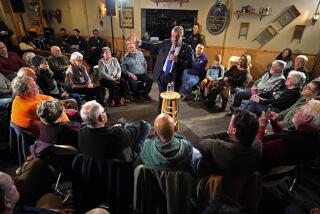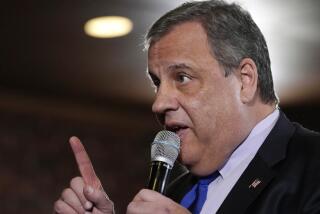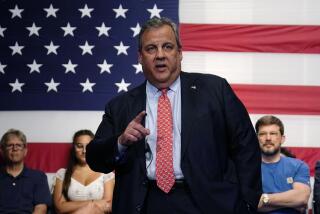Gov. Chris Christie expresses contrition over bridge scandal
- Share via
FORT LEE, N.J. — With a daylong public apology for political retribution he blamed on his staff, New Jersey Gov. Chris Christie tried mightily Thursday to keep a local traffic issue from blossoming into a full-blown threat to his 2016 presidential aspirations. At least one constituent, Robert Tessaro, wasn’t buying it.
In Christie’s first display of contrition, a nationally televised news conference that lasted almost two hours, the Republican governor announced he had canned two aides implicated in the plan to block access roads to the George Washington Bridge here in September, ostensibly because the mayor had not endorsed Christie’s reelection.
Then Christie traveled to Fort Lee intending to apologize in person to the mayor and to commuters caught in the four-day snarl. Tessaro called it a “photo op.”
Tessaro’s wife had to work from home on the days the local roads were clogged. He had to take his daughter to his mother’s house because he couldn’t get to the day care across town.
“I hope this continues to haunt him,” said Tessaro, one of dozens of Fort Lee residents who awaited Christie’s arrival outside the municipal building. “No matter what he knew and didn’t know, these were his people and the culture he created in the state, and it’s not right.”
READ: Controversial Christie staffer emails
As Christie worked to limit the political fallout, the scandal’s legal impact spread. David Wildstein, a Christie appointee to the Port Authority of New York and New Jersey before he resigned as the controversy brewed last month, declined to testify at an Assembly hearing, citing his right against self-incrimination. He was found in contempt.
A spokeswoman for the U.S. attorney’s office said it was reviewing the actions of Christie’s team “to determine whether a federal law was implicated.” Christie said he would encourage his staff to cooperate with any investigations.
Christie’s contrition tour was meant to stop the spread of a story that has delighted the area’s tabloids, distressed commuters, energized the governor’s political enemies and raised questions about whether the actions led to the death of a 91-year-old woman. (Authorities have said paramedics were delayed in reaching her, but they have not specifically blamed the death on the actions of the governor’s team.)
Emails released Wednesday showed Wildstein, Christie deputy chief of staff Bridget Anne Kelly and the governor’s campaign manager, Bill Stepien, among others, discussing the plan and news coverage of it. Up to four access lanes in Fort Lee were closed, clogging traffic throughout the town. Schoolchildren, paramedics and commuters were among those trapped in extensive delays.
The emails suggested that the move was retaliation for Fort Lee Mayor Mark Sokolich’s failure to endorse Christie for reelection. Pleas for assistance after the lanes closed were met with mockery, including a jab at the students as being the children of those voting for Christie’s Democratic opponent in November.
On Thursday, Christie said he had fired Kelly and cut Stepien off from seeking to lead the state Republican Party and working for the Republican Governors Assn., which Christie leads. The governor said he had asked his senior aides last month if any of them was responsible for political retaliation and no one came forward.
“I had no knowledge or involvement in this issue, in its planning or its execution, and I am stunned by the abject stupidity that was shown here,” he said, adding that “that doesn’t matter; I’m ultimately responsible.”
Christie said he had long denied that the action was political — and had even joked about moving road safety cones himself — because his campaign had never sought Sokolich’s endorsement.
“I never saw this as political retribution because I never thought he did anything to us,” he said, a statement that if anything added mystery to the events.
PHOTOS: Scenes from “Bridgegate”
The controversy might have been limited to New York and New Jersey, neighbors served by the bridge, but for the looming 2016 presidential campaign. On the strength of his blowout reelection victory, Christie vaulted to the top of the prospective GOP presidential heap, and his new position as head of the governors’ association ensures that he will have a presence in key electoral states until he makes a formal decision on whether to run.
Views on whether Christie had stanched the political bleeding depended largely on geography. New Jerseyans were aghast that access to one of the area’s most traveled bridges, a major route into and out of New York, would have been targeted in a political attack.
“It’s not about backing up the bridge,” said Patrick Murray, director of the Monmouth University Polling Institute in West Long Branch, N.J. “It’s about the innocent people in that small town who were caught and stopped from doing what they needed to do because of the bridge traffic, stopped from important things like getting their kids to school.”
Many outside the state, however, said the effect on Christie’s future would be muted unless his claim that he did not know of the traffic-chaos plan was contradicted.
“Christie handled about as well as he could. Unless smoking gun turns up tying him to scheme, or others arise, he lives 2 fight another day,” President Obama’s former chief strategist, David Axelrod, said via Twitter. (Other Democrats gleefully piled on with criticism of Christie and Republicans he is expected to campaign with this year.)
Republicans almost universally contended that the issue was overblown.
“I can assure you the average Republican primary voter of 2016 does not give a tinker’s darn about whether lanes were closed in Fort Lee, N.J., by a staffer who was unhappy the mayor didn’t endorse Christie,” said Steve Duprey, one of two New Hampshire representatives on the Republican National Committee.
Tom Rath, another veteran strategist in the first presidential primary state, said the matter would blow over “as long as this stays at this level of information [and] as long as he doesn’t get any closer to it.”
But there was another threat, one that Christie’s expressions of humility and embarrassment on Thursday were meant to blunt: It could emphasize the downside of his take-no-prisoners persona that critics have described as bullying.
Christie took pains to deny that he was angry, engaged in political payback, or promoting a brutish culture. “I am who I am, but I am not a bully,” he said.
That he had to repeatedly deny it spoke to the problem. “It does hint at what’s the real fuel for his candidacy, which is his personality,” said Republican strategist Mike Murphy. “The question is whether it rockets him to the White House or turns into a political H-bomb mushrooming over New Hampshire.”
In New Jersey, according to Ben Dworkin, a political scientist at the state’s Rider University, the incident could undermine voters’ acceptance of Christie.
“They didn’t particularly care if he yelled at teachers unions, which aren’t very popular. That was fine with voters. This is different because it’s an abuse-of-power allegation. It’s a whole new level of bullying. It’s like comparing the difference between a kid who picks on other kids in the schoolyard and a teacher or the principal picking on a kid.”
Some of those affected said they would reserve judgment. Craig Leeds, a Fort Lee lawyer, said he considered himself a Christie supporter before the emails were revealed. Whether he continues to be one depends on what else emerges.
“I’m still optimistic and still very much hopeful that it will turn out that he had no knowledge of this very unfortunate and extremely political action,” he said.
But Miriam Hernandez said she regrets voting for Christie in November. She’s a crossing guard who had to deal with the traffic; her husband’s 45-minute commute stretched to three hours. She isn’t convinced that Christie was uninvolved.
“I don’t buy it for a second,” she said. “But I could be wrong.”
Semuels reported from Fort Lee, Decker from Los Angeles and Barabak from San Francisco.
More to Read
Sign up for Essential California
The most important California stories and recommendations in your inbox every morning.
You may occasionally receive promotional content from the Los Angeles Times.
















